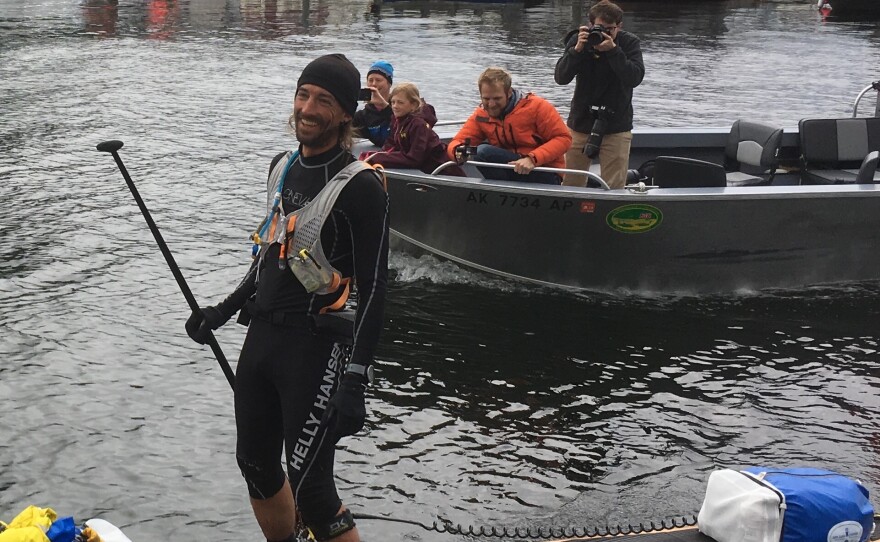An Orcas Island, Washington, man has become the first person to complete the Race to Alaska on a standup paddleboard. Karl Kruger stroked 750 miles solo from Port Townsend up the Inside Passage, crossing the finish line in Ketchikan Sunday evening.
A crowd came down to the harbor in Ketchikan to see Kruger accomplish an athletic feat that quite a few people had called crazy, nutty or foolhardy.
The exhausted and soft-spoken 45-year-old glided to the dock, stepped off his 17-foot standup paddleboard and rang the finisher's bell. Then Kruger embraced his waiting wife and daughter and expressed amazement at what he had done over the past two weeks.
"There were days where every single stroke was a barrier and I just wanted to stop," Kruger said. "Everything was screaming at me to stop. So it was absolutely mental, absolutely."
Kruger maintained an incredible pace on his journey north. He averaged about 50 miles per day on his standup paddleboard. Two other paddleboarders from northwest Washington state, Luke Burritt and Erdogan Kirac, dropped out of the Race to Alaska after one week near Campbell River, midway up Vancouver Island.
The timed portion of the Race to Alaska covers the 710 miles from Victoria, British Columbia, to Ketchikan. Kruger clocked in at 14 days, six hours and 17 minutes. The paddleboarder posted a faster time than some sailboats, kayaks and two-person rowboats that are still on the watery, mostly wilderness race course. This was Kruger's second attempt at the Race to Alaska on a paddleboard. Last year, he was forced to quit after about 100 miles due to stress fractures in his board.
The zany adventure race has two basic rules: no motors and no support crews. A race co-founder once compared the event to the Iditarod sled dog race, "but with a chance of drowning or being eaten by a bear or run over by a freighter."
This year's race was won by three Massachusetts brothers racing in a 28-foot trimaran dubbed Team Pure and Wild/Freeburd. They reached Ketchikan after sailing nonstop for four days and three hours through erratic winds, storm and calm. The 2017 edition of the Race to Alaska had 41 non-motorized entries in many designs, sizes and human or sail-powered propulsion methods.
Kruger had a race plan that called for paddling for two eight hour shifts per day alternated with rest on shore. He strapped about 50 pounds of food and gear onto the bow and stern of his board, which looks like a stretched surf board with a pointed prow. To save weight, Kruger sustained himself mainly on high calorie food wafers along with some protein shakes and energy bars and gels.
At the finish line, the wet suit-clad Kruger happily accepted the first of what are bound to be many free beers as he answered questions.
"The last few days have been really tough," Kruger said. "One day it's one thing, the next day it's something else.
He described paddling into squalls as “a boxing match.” At other times he had a tailwind with following seas, which he compared to “a sled ride.”
"I enjoyed every minute, even the hard stuff,” concluded the racer who entered the maritime marathon as “Team Heart of Gold."
Kruger trained for months to prepare for the race with long distance paddles on a new, custom-built expedition board as well as practicing off the water on a balance board and working on core strength with a personal trainer.
Kruger and his wife run a sailing charter business based in Washington's San Juan Islands.
Kruger credited his wife Jessica for originally planting the seed to try the Race to Alaska on a standup paddleboard.
"He had been really loving the standup paddling at that point and been doing it for a couple of years," Jessica Kruger recalled dockside in Ketchikan Sunday. "It just made sense to me that if you want to do this race and if you wanted to do it solo, why not paddle it."
NPR member station KRBD in Ketchikan contributed on-scene reporting to this story.




